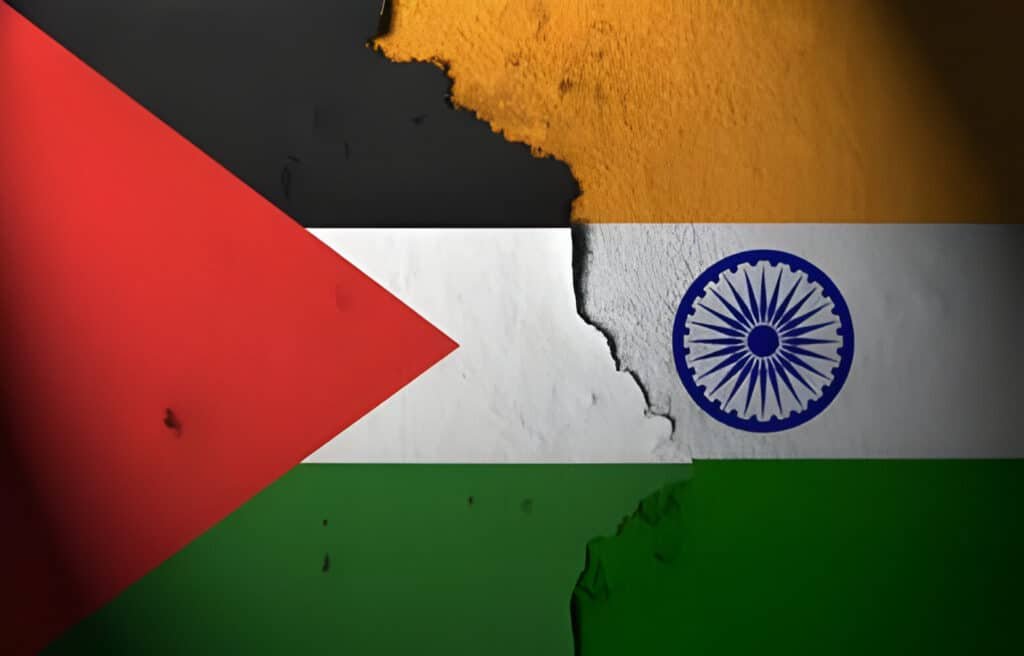Spain, Ireland and Norway’s[1] decision to recognize Palestine as a state, announced on May 22, 2024, represents a significant shift in the international stance towards the Israeli-Palestinian conflict. This decision by a Western nation reaffirms the Palestinian quest for statehood, challenging the global diplomatic equilibrium. Concurrently, it prompts a re-evaluation of other nations’ positions, notably India’s, which has undergone substantial evolution over the decades. This essay examines India’s historical support for Palestine, its current diplomatic balancing act between Israel and Palestine, and the strategic imperatives shaping its foreign policy.
Historical Context: India’s Support for Palestine
India’s historical support for Palestine is rooted in its own colonial experience and commitment to anti-colonialism. India was the first non-Arab country to recognize the Palestine Liberation Organization (PLO) as the legitimate representative of the Palestinian people in 1974. Subsequently, in 1988, India formally recognized the State of Palestine. These actions underscored India’s consistent advocacy for Palestinian self-determination and its alignment with the broader Non-Aligned Movement (NAM) principles, emphasizing sovereignty and independence for all nations.
Shifts in Policy: Establishing Ties with Israel
The late 20th century witnessed a strategic shift in India’s foreign policy, marked by the establishment of full diplomatic relations with Israel in 1992. This move was driven by pragmatism, acknowledging Israel’s technological and military prowess which could significantly benefit India. This diplomatic normalization[2] was not an abandonment of Palestinian support but a recalibration to serve India’s national interests better.
India’s relationship with Israel has since flourished, encompassing defense, agriculture, technology, and intelligence cooperation[3]. The defense sector, in particular, stands out with Israel becoming a key supplier of advanced military equipment to India. Frei’s analysis highlights that this partnership includes critical technologies such as missile systems and unmanned aerial vehicles (UAVs), which are vital for India’s defense modernization.
Navigating the Israel-Palestine Conflict
India’s diplomatic challenge lies in maintaining its historical support for Palestine while fostering a robust partnership with Israel. This balancing act has become increasingly intricate with recurrent Israel-Hamas conflicts[4]. During these conflicts, India has often called for restraint and dialogue, emphasizing a two-state solution without explicitly condemning either side. This approach aims to maintain neutrality, ensuring that India’s relations with both Israel and the Arab world remain unaffected.
The Ministry of External Affairs (MEA)[5] of India reiterated this balanced stance in response to a parliamentary question, affirming support for a negotiated settlement leading to a sovereign, independent, and viable State of Palestine coexisting peacefully with Israel. This official stance underscores India’s commitment to a diplomatic resolution while avoiding actions that might jeopardize its strategic interests with Israel.
Strategic and Economic Considerations
India’s nuanced stance is also shaped by broader strategic and economic considerations. Israel’s expertise in high-tech industries, water management, and agriculture aligns with India’s developmental goals, making bilateral cooperation mutually beneficial. Furthermore, the defense partnership[6], is critical for India’s security landscape, providing access to cutting-edge technologies and equipment.
Economic ties have also strengthened, with bilateral trade encompassing a wide range of sectors. This economic interdependence further complicates India’s position, necessitating a careful diplomatic approach to avoid alienating either side.
Continuity and Change in India’s Policy
India’s policy towards Palestine, while evolving, reflects a blend of continuity and change. Expert analysis[7] suggests that despite closer ties with Israel, India continues to support Palestinian development through humanitarian aid and infrastructure projects. This dual approach allows India to maintain its traditional stance on Palestinian self-determination while adapting to contemporary geopolitical realities.
India’s voting patterns at the United Nations also reflect this balance. While India has supported resolutions favoring Palestinian rights, it has occasionally abstained on contentious issues, signaling a desire to maintain diplomatic flexibility[8].
Conclusion
Norway’s recognition of Palestine brings renewed focus on the international dynamics of the Israel-Palestine conflict, highlighting the complex balancing acts nations like India must perform. India’s foreign policy towards Israel and Palestine exemplifies a pragmatic approach driven by strategic, economic, and historical factors. As global geopolitical landscapes continue to evolve, India’s ability to balance its historical commitments with its contemporary alliances will be pivotal in shaping its role as a major international actor. This delicate diplomacy underscores the broader challenges nations face in navigating multifaceted international relations.
[1] https://www.aljazeera.com/news/2024/5/22/norway-will-recognise-palestinian-state-pm-says
[2] https://www.brookings.edu/articles/how-india-can-maintain-its-delicate-israel-palestine-balancing-act/
[3] https://www.freiheit.org/india/indias-stance-israel
[4] https://www.geopoliticalmonitor.com/india-middle-east-relations-unsettled-by-israel-hamas-conflict/
[5] https://www.mea.gov.in/lok-sabha.htm?dtl/37546/QUESTION+NO48+INDIAN+STAND+ON+PALESTINE
[6] https://www.freiheit.org/india/indias-stance-israel
[7] https://www.thehindu.com/opinion/lead/change-and-continuity-in-indias-palestine-policy/article67904383.ece
[8] https://www.brookings.edu/articles/how-india-can-maintain-its-delicate-israel-palestine-balancing-act/

